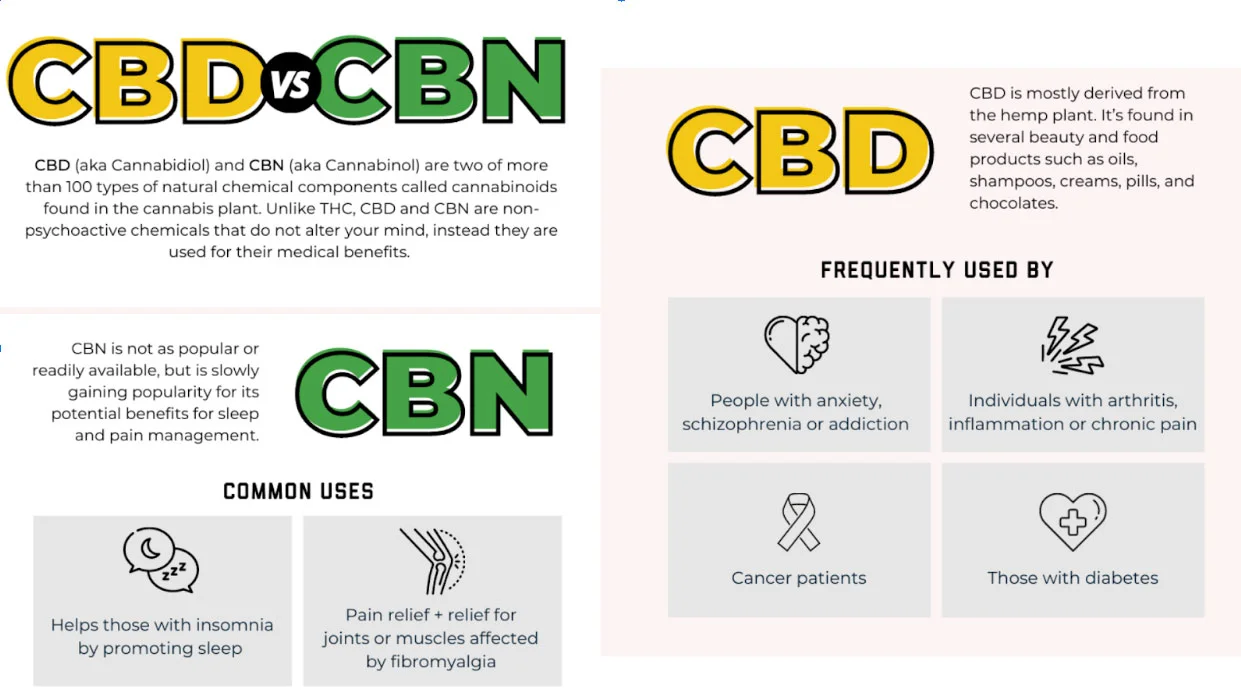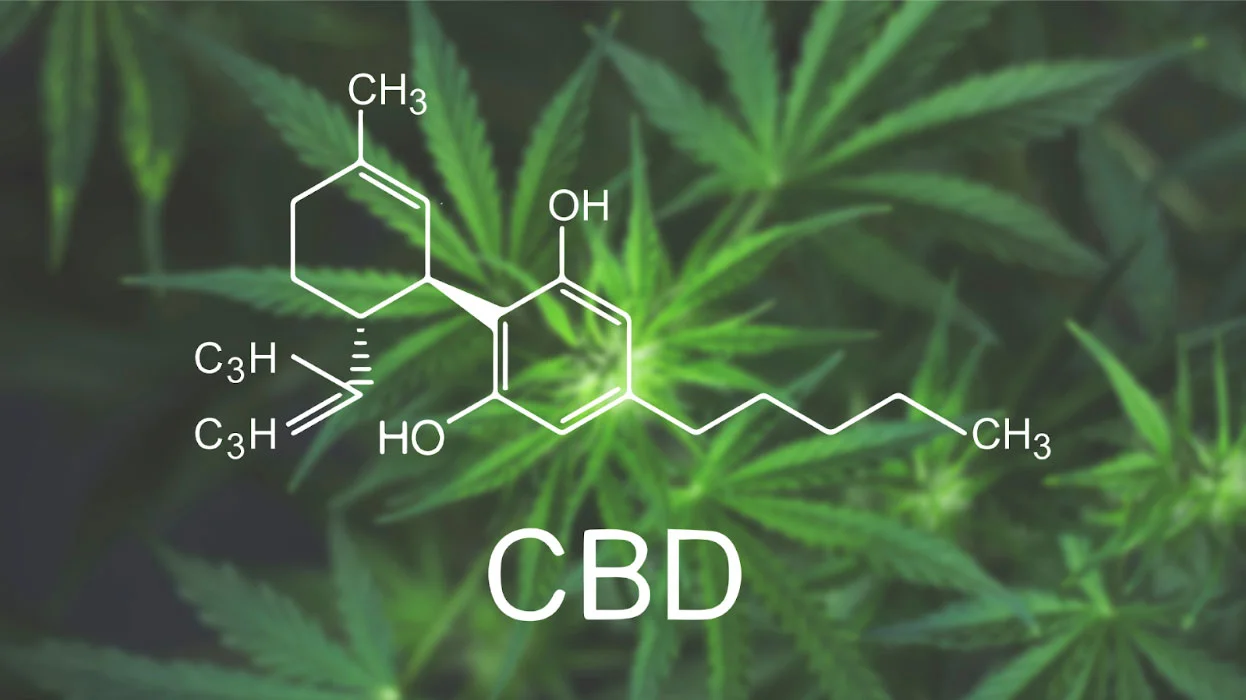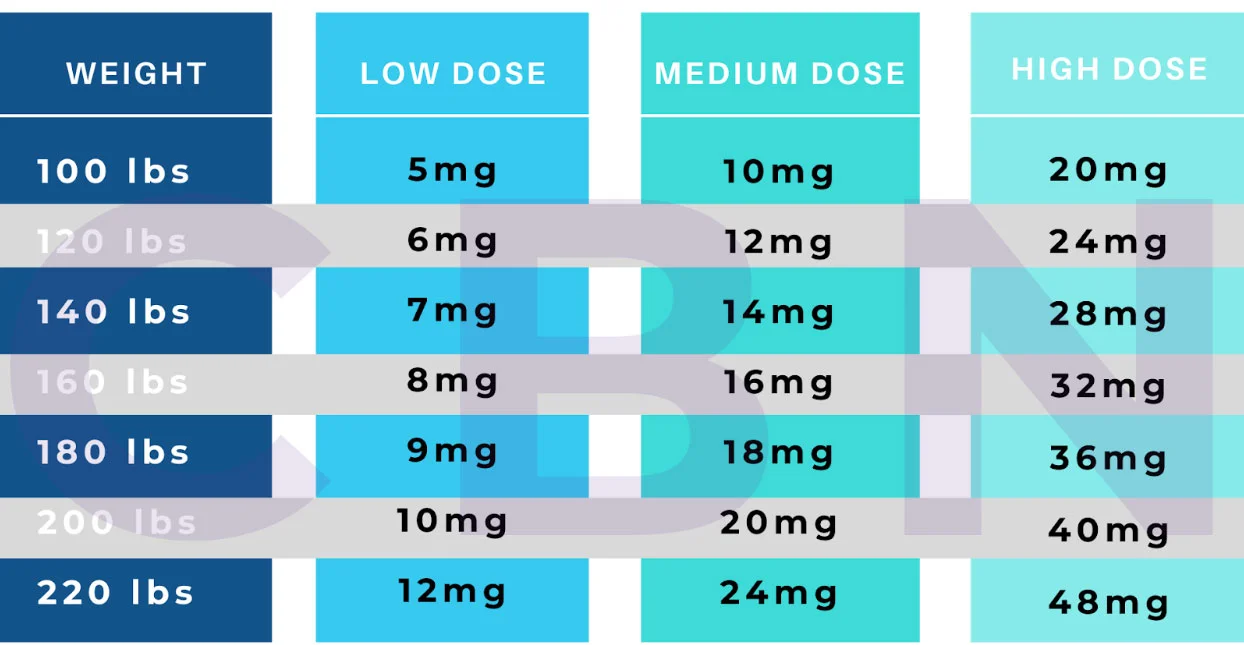CBD vs. CBN: Exploring the Applications, Benefits, and Risks


In recent years, cannabinoids have become increasingly popular for their potential health benefits. Two of the most talked about cannabinoids are CBD (cannabidiol) and CBN (cannabinol). While both are derived from the cannabis plant, they offer different potential benefits and applications.
This article will explore the applications, benefits, and risks associated with CBD and CBN, helping you make informed decisions about incorporating these cannabinoids into your wellness routine.

Cannabinoids are chemical compounds found in the cannabis plant that interact with our body’s endocannabinoid system (ECS). The ECS plays a crucial role in maintaining balance and overall well-being by regulating various physiological processes, such as mood, pain sensation, appetite, and sleep. There are over 100 different cannabinoids, each with its unique properties and potential benefits.
Among these cannabinoids, CBD and CBN have gained particular attention. CBD, or cannabidiol, is a non-intoxicating compound derived primarily from hemp plants. It does not produce the ‘high’ associated with THC (tetrahydrocannabinol), making it a popular choice for those seeking the therapeutic benefits of cannabis without the mind-altering effects.
On the other hand, CBN, or cannabinol, forms when THC degrades over time due to exposure to light, heat, and oxygen. While CBN can have mild psychoactive effects, they are much less potent compared to THC. CBN is often associated with sedative properties, which may contribute to its potential as a sleep aid.

CBD, short for cannabidiol, is a versatile cannabinoid that offers a range of potential health benefits. Here are some of the most notable applications and benefits of CBD:
CBD is commonly used to promote relaxation and reduce stress. Many individuals incorporate CBD into their daily routines to help manage the stresses of life and support overall well-being. It’s available in various forms, such as oils, capsules, and edibles, making it easy to integrate into your lifestyle.
CBD has been explored for its potential analgesic properties. It may help alleviate pain associated with conditions like arthritis, migraines, neuropathy, and chronic pain syndromes. Depending on the specific needs, CBD can be applied topically or consumed orally. Topical applications are beneficial for localized pain, while oral consumption can provide more general relief.

CBD is often used to help manage anxiety and stress-related disorders. It may help reduce the symptoms of generalized anxiety disorder, social anxiety, and post-traumatic stress disorder (PTSD). However, it’s important to use CBD in conjunction with professional guidance for anxiety disorders to ensure it is part of a comprehensive treatment plan.
CBD is also popular as a natural aid for sleep. It may help improve sleep quality by promoting relaxation and reducing anxiety. Many people take CBD in the form of oils, capsules, or edibles before bedtime to assist with falling asleep and staying asleep.
CBD has shown promise in several medical applications. For instance, it has been studied extensively for its ability to reduce seizures in certain epilepsy syndromes, such as Dravet syndrome and Lennox-Gastaut syndrome.
The FDA has even approved a CBD-based drug, Epidiolex, for the treatment of these conditions. CBD is being explored for potential benefits in managing conditions like Parkinson’s disease, schizophrenia, diabetes, multiple sclerosis, anxiety, and even cancer. While more research is needed, some studies suggest that CBD may help with insomnia and chronic pain.

While CBD is often in the spotlight, CBN (cannabinol) is slowly gaining recognition for its unique properties and potential benefits. Although research on CBN is still limited compared to CBD, it has shown promise in several areas:
CBN is frequently explored for its potential sedative properties. It is often used as a natural aid for individuals struggling with insomnia or sleep disturbances. Consuming CBN in the form of oils, capsules, or edibles before bedtime may assist with falling asleep and staying asleep. Many users report improved sleep quality and a more restful night’s sleep.
There have been reports suggesting that CBN may have appetite-stimulating effects. This could be beneficial for individuals dealing with appetite loss or medical conditions that result in decreased appetite. However, further research is needed to fully understand this potential application.
Although research on CBN is limited, it has been suggested that it may possess analgesic properties. CBN may be used as part of a pain management regimen, providing relief for conditions such as chronic pain or inflammation. Some studies have noted that when used together with CBD, the pain-relieving effects can be enhanced.

CBN has exhibited some neuroprotective properties in preliminary studies. For instance, it has been found to help delay the onset of amyotrophic lateral sclerosis (ALS), a disease that affects brain and spinal cord cells. While these findings are promising, more research is necessary to fully understand the effectiveness and mechanisms involved.
Even though CBN is less well-known than CBD, its potential benefits, particularly in sleep support and pain management, are worth noting. As research continues, we may discover even more applications for this intriguing cannabinoid.
While CBD and CBN share some similarities, they also have distinct differences that set them apart in terms of their chemical structure, production, effects, and potential benefits. Understanding these differences can help users make informed decisions about which cannabinoid might best suit their needs.
CBD and CBN have different chemical structures. CBD is derived primarily from the hemp plant and does not undergo the aging process that creates CBN from THC. CBN is essentially THC that has been exposed to oxygen and light, leading to degradation and the formation of a new cannabinoid. This difference in origin contributes to their unique properties and effects.
One of the significant differences between CBD and CBN is their psychoactive properties. CBD is non-intoxicating and does not produce the ‘high’ associated with THC. This makes it suitable for individuals seeking therapeutic benefits without psychoactive effects. Conversely, CBN can have mild psychoactive effects, although they are far less potent than those of THC. This mild psychoactivity is due to its origin from THC degradation.
CBD is abundant in the hemp plant, making it relatively easy to extract and produce in large quantities. It is widely available in various forms, such as oils, tinctures, capsules, and topicals. On the other hand, CBN is less abundant and forms naturally when THC ages and oxidizes. The production process for CBN involves allowing THC to degrade, which can take time or require specific conditions to expedite.
The ‘entourage effect’ refers to the synergistic interaction between various cannabinoids and terpenes present in the cannabis plant. Both CBD and CBN can interact with other cannabinoids to enhance overall effects. For instance, combining CBD and CBN might provide enhanced pain relief or better sleep support due to their complementary properties. The entourage effect underscores the potential benefits of using full-spectrum or broad-spectrum cannabis products that contain a variety of cannabinoids and terpenes rather than isolated compounds.
In summary, while CBD and CBN share some therapeutic properties, their differences in chemical structure, psychoactivity, production, and interaction with other cannabinoids make them suitable for different applications and user preferences.
While CBD is generally considered safe, some users may experience side effects. Common side effects include dry mouth, drowsiness, and digestive issues such as diarrhea or changes in appetite. Additionally, CBD can interact with certain medications, potentially altering their effectiveness or leading to adverse reactions. It is essential to consult a healthcare professional before incorporating CBD into your routine, especially if you are taking other medications or have underlying health conditions.
CBN’s side effects are less well-documented due to the limited research compared to CBD. However, some users report drowsiness, which aligns with its potential use as a sleep aid. As with any cannabinoid, there may be a risk of interaction with other medications. The lack of comprehensive research on CBN means that potential long-term effects and safety profiles are not fully understood. Therefore, it is advisable to use CBN cautiously and under the guidance of a healthcare provider.
Overall, while both CBD and CBN offer promising benefits, they come with potential risks and side effects. Consulting with a healthcare professional can help mitigate these risks and ensure that you use these cannabinoids safely and effectively.
The legal status and availability of CBD and CBN can vary significantly depending on the country and even within different regions of the same country. Here is a general overview of their legal status and the types of products available:
In the United States, CBD derived from hemp (containing less than 0.3% THC) is legal at the federal level due to the 2018 Farm Bill. However, state laws vary, and some states have restrictions or specific regulations governing the sale and use of CBD products. CBD derived from marijuana plants may be subject to different regulations and is often only legal in states with medical or recreational cannabis programs.
CBN, on the other hand, is less commonly regulated but is generally considered legal if derived from hemp with low THC content. As CBN gains popularity, it may face more specific regulatory scrutiny. It is essential to stay updated with local laws and regulations regarding both CBD and CBN.

Both CBD and CBN are available in various forms to cater to different user preferences and needs. Common product types include:
In conclusion, the legal landscape for CBD and CBN is evolving, and it is crucial to stay informed about current regulations in your area. Consumers have a wide range of product options to choose from, allowing for personalized and effective use of these cannabinoids.
In choosing between CBD and CBN, it is essential to consider their differences, including their chemical structures, psychoactive components, and how they interact with the endocannabinoid system. Consulting with a healthcare professional can provide personalized advice and ensure the safe and effective use of these cannabinoids.
As the legal landscape for cannabinoids continues to evolve, staying informed about regulations and available products will help consumers make educated decisions. Whether you opt for CBD, CBN, or a combination of both, these cannabinoids offer a range of potential benefits that can enhance your overall well-being.